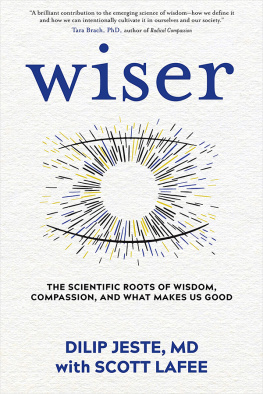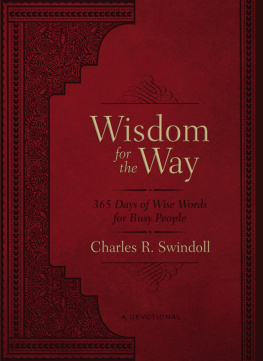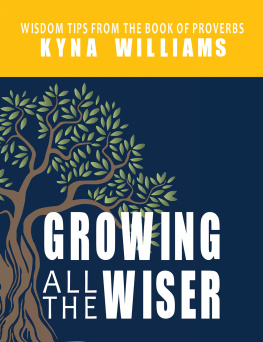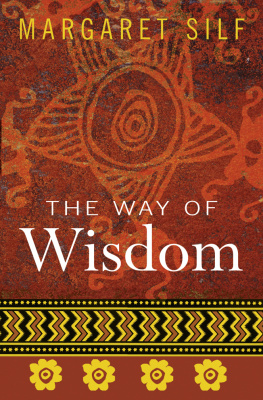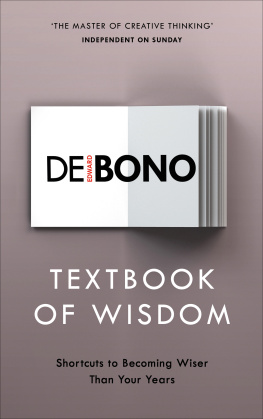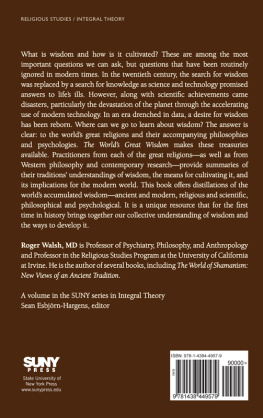
Praise for Wiser
Wiser is a brilliant contribution to the emerging science of wisdomhow we define it, research it, and how we can intentionally cultivate it in ourselves and our society. A timely and hope-giving book as our world faces challenges that require the deepening of our wisdom as a species.
Tara Brach author of Radical Compassion
The new science of wisdom is transforming the way we understand human potential and showing that the ancients were right: wisdom is real, wisdom is precious, and we can all be, yes, wiser. Drawing on cutting-edge neuroscience and a lifetime of research, Dilip Jeste brings the attributes of wisdomcompassion, self-reflection, humor, curiosity, and spiritualityto every page. He shows that wisdom can be developed and strengthened, and he explains how. A lot of books have made me smarter. This one made me better.
Jonathan Rauch author of The Happiness Curve, senior fellow of Brookings Institution, and recipient of National Magazine Award
Wiser is the readable summation and thoughtful culmination of the thought and work by Dr. Jeste on wisdom over many years. No medical scientist, to my knowledge, has been willing to tackle the expansive complexities of practical wisdom, what some may label as wisdom that matters, as thoroughly as the author. Jeste takes us on a journey through the neurobiological foundations as well as the psychological and social components of practical wisdom. He artfully integrates the unique perspectives of his cultural background and a stellar career of scientific inquiry using Western methodologies. He has collaborated with and supported conversations among many scholars and has distilled these conversations into a basic handbook that will be of immense value to all who read the material, more importantly to those who are willing to grapple with this ever-expanding horizon of inquiry. That horizon is informed by science, the humanities, and wisdom itself.
Dan Blazer, MD, PhD author of The Age of Melancholy and Freud vs. God, JP Gibbons professor emeritus of psychiatry and behavioral sciences, Duke University School of Medicine
Much has been written about human tendencies to compete, with winner-take-all rewards. Yet none of us would survive alone. The true story about humankind involves cooperation, kindness, and compassion. This lesson appears to grow stronger with age. Dilip Jeste, with Scott LaFee, details the science behind the proclivities to be concerned for the welfare of others and the circumstances that enrich it. Read this definitive account of wisdom and be wiser for it.
Laura L. Carstensen, PhD author of A Long Bright Future: An Action Plan for a Lifetime of Happiness, Health, and Financial Security; founding director, Stanford Center on Longevity; Fairleigh S. Dickinson Jr. professor in public policy and professor of psychology, Stanford University
In Wiser, Jeste, with LaFee, has written a compelling new book about the scientific research that takes the notions of wisdom and morally grounded reasoning out of the realms of myth and philosophy and into the bright light of modern psychology and neuroscience. From defining wisdom as an aspect of human mind and brain to explaining its psychological components and how to become wiser, Jeste, with LaFee, has produced an important and exciting new book on the science of wisdom. This is a deeply engaging book that explains clearly the science of wisdom and provides practical suggestions for wiser reasoning grounded in solid research.
Howard C. Nusbaum, PhD founding director, Center for Practical Wisdom, and Stella M. Rowley professor of psychology, University of Chicago
We have never needed this book more than we need it now. It is the right book, at the right time, and for all the right reasons. Professor Dilip Jeste, with Scott LaFee, traces the scientific and sociocultural roots of wisdom, its cultivation, and its deep links to compassion and to lives well led. Not only medical and social scientists but also health and social policy makers and general readers will find insight and comfort in this volume. We need wisdom and courage for the facing of this hour. Wiser helps immensely.
Charles F. Reynolds III, MD distinguished professor of psychiatry emeritus, University of Pittsburgh School of Medicine; recipient of Pardes Humanitarian Prize in Mental Health
Sounds True
Boulder, CO 80306
2020 Dilip Jeste
Sounds True is a trademark of Sounds True, Inc.
All rights reserved. No part of this book may be used or reproduced in any manner without written permission from the author(s) and publisher.
Published 2020
Book design by Maureen Forys, Happenstance Type-O-Rama
Printed in the United States
Library of Congress Cataloging-in-Publication Data
Names: Jeste, Dilip V., author. | LaFee, Scott, author.
Title: Wiser : the scientific roots of wisdom, compassion, and what makes
us good / Dilip Jeste, MD with Scott LaFee.
Description: Boulder, CO : Sounds True, 2020. | Includes bibliographical
references and index.
Identifiers: LCCN 2020005609 (print) | LCCN 2020005610 (ebook) | ISBN
9781683644637 (hardback) | ISBN 9781683644644 (ebook)
Subjects: LCSH: Wisdom. | Neurobiology. | CompassionPsychological
aspects.
Classification: LCC BF431 .J47 2020 (print) | LCC BF431 (ebook) | DDC
153.9dc23
LC record available at https://lccn.loc.gov/2020005609
LC ebook record available at https://lccn.loc.gov/2020005610
10 9 8 7 6 5 4 3 2 1
To three womenmy wife, Sonali, and our daughters, Shafali and Neelumand three boysgrandsons Nischal, Kiran, and Arjunwho have been doing their best to make me wiser faster.
Dilip Jeste, MD
To Marlee J, marrying you is the wisest thing I have done.
Scott LaFee
Introduction
Seeking Wisdom of the Ages at All Ages
Wisdom is not intelligence.
It is more, much more.
To be sure , we all want to be smart. We all know people who are intelligent, to whom the workings of the world come a bit more readily and easily. Smart people seem to understand complexities. They make connections, see patterns, and find solutions with efficiency and apparent ease. They are the classmates who got straight As, the coworkers with the brilliant plan or best way to make the bottom line. They see the next big thing before others are even looking.
But many smart people are not happy. They appear perpetually stressed and under pressure. They may appear to care only about themselves, making you reluctant to seek their advice because you dont know whose priorities are first. You cant always predict how they will react to your request. They may smile and say, Of course. They may become angry. They may be indifferent.
Its good (and often profitable) to be smart, but being wise is more interesting and more useful if our goal is to live a full and meaningful life. Im not referring simply to the pursuit of happiness, which is distinctly subjective and frequently shifting. What makes you happy one moment or at one point in your life may not in another moment or as you age. Our notions of happiness change over time. And they are often different from others.
Of course, happiness is a good goal. It typically accompanies becoming wiser, but wisdom is more about acquiring a deeper understanding about meaning in life, of being able to see how and where you fit into the grander scheme of things and how you can be a better person for yourself and for others. Searching for and finding meaning and purpose in life is not limited to philosophers. It is associated with better health, wellness, and perhaps longevity and definitely with wisdom. People who have a clear-eyed sense of the rational meaning in lifewhatever that may beare happier and healthier than those without it. They are also wiser.
Next page
